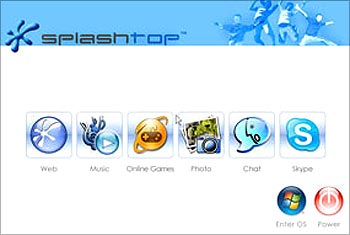Photographs: Fabrizio Bensch/Reuters Leslie D'Monte
A metaphor for the internet, cloud computing stores data and applications on the internet. Most of us who use web-based email services like Gmail, Yahoomail or Windows Live (Hotmail) or have watched a video online or shared snaps using photo-hosting services like flickr or snapfish or read news online or watch TV shows on the internet are using 'cloud computing' services without realising it.
Users do not have to invest in hardware (reducing costs considerably) and maintenance experts.
Why Google, start-ups eye cloud computing
Image: An employee plays with lego at the New York City office of Google.Photographs: Erin Siegal/Reuters
Operating systems go many steps further. The search giant, however, is not the first to announce a cloud-based OS. Earlier, in April this year for instance, virtualisation leader, VMware, had announced what it claimed to be "...the industry's first operating system for building the internal cloud..."
And it's just not Google or VMware but start-ups like Ghost, Glide, eyeOS and even software giant Microsoft which announced Gazelle (though it's not exactly a web-based OS) and the Windows Azure platform.
Why Google, start-ups eye cloud computing
Image: Zvi Schreiber, Founder & CEO, G.ho.stPhotographs: G.ho.st Website
It's ultimate stated mission is to be a completely open web operating system wherein you can run all the web's leading hosted apps and services on the G.ho.st desktop and not only G.ho.st's own apps.
Ghost is interestingly a Palestinian-Israeli (yes, you read right) collaboration. The company plans to make money through affiliate deals for the services it links to.
Why Google, start-ups eye cloud computing
Image: Glide's versionPhotographs: Glide Website
Backup, security, software updates and other administration tasks which you have to perform on your PC, are instead performed automatically for the VC with professional oversight.
You get a file system (with 5GB of storage for free), a media player, and links to some apps. For example, if you want to edit a word processing file, you can launch it into Thinkfree or Zoho.
Another company, Glide, has more of what can be termed as a web application suite rather than a Web OS. The new "Glide OS 3.0" is a fairly complete web-based desktop, with a word processor, a presentation app, a spreadsheet, e-mail, calendar, media players.
Unlike Ghost, Glide has an offline version too, and a sync engine that keeps your online and offline files in lockstep. Glide works on mobile devices, and the offline apps works on PCs, Macs, and Linux devices.
Why Google, start-ups eye cloud computing
Image: Eric Schmidt (L) CEO of Google, Bill Gates former CEO of Microsoft talk outside the Sun Valley Inn.Photographs: Rick Wilking/Reuters
But not many would buy that argument.
However, its Windows Azure Platform provides a range of functionality to build applications that span from consumer web to enterprise scenarios and includes a cloud operating system and a set of developer services.
Why Google, start-ups eye cloud computing
Image: Splashtop screenshotPhotographs: Splashtop Website
Cloud computing, though, is old wine but well-packaged in a new bottle. What was known as mainframe time-sharing in the 60s is also being called 'utility' computing, and what was being touted as an application service provider (ASP) model is now known as SaaS.
It's gathering momentum since the number of applications and the amount of content in the cloud now available to both consumers and corporations have grown to a critical mass, reason consulting firm Booz & Company analysts. Gartner says worldwide service cloud revenue is expected to reach $150.1 billion in 2013.








article